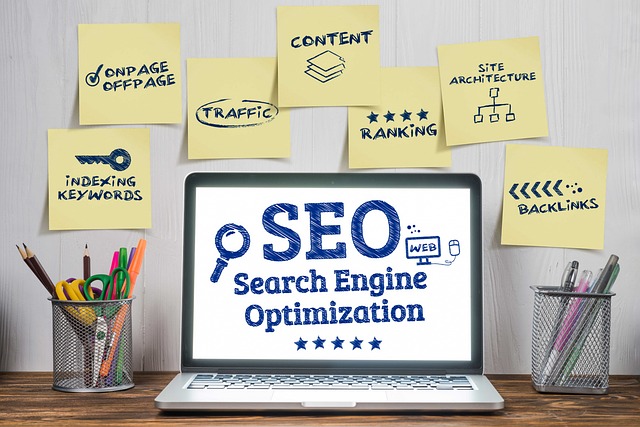SEO Services are essential for boosting website visibility and traffic through strategic optimization. Key elements include keyword research, mobile responsiveness, page speed, and high-quality backlinks. Professionals offer tailored solutions like content optimization, technical audits, link building, and analytics monitoring. On-page SEO focuses on keyword placement in titles, headings, meta descriptions, and body text. Off-page strategies build authority through reputable backlinks from influential sources and social media engagement. Success is measured using tools like Google Analytics to track rankings, CTRs, and backlink profiles. Staying ahead in SEO services is crucial for business competitiveness in today's digital landscape.
In today’s digital landscape, a strong online presence is paramount. This article guides you through the intricate world of SEO Services, equipping you with essential knowledge for optimal website optimization. We’ll explore fundamental concepts, from understanding the basics of Search Engine Optimization to deciphering key components that drive success. By delving into on-page and off-page strategies, we’ll reveal powerful techniques to enhance visibility and build authority. Additionally, we’ll equip you with tools to measure performance and stay ahead of evolving SEO Services trends.
Understanding SEO Services: The Basics of Search Engine Optimization

Search Engine Optimization (SEO) is a set of practices designed to enhance a website’s visibility and ranking on search engine results pages (SERPs). At its core, SEO revolves around understanding how search engines crawl, index, and rank web content. Key components include optimizing website content with relevant keywords, ensuring mobile-friendliness, improving page load speeds, and building high-quality backlinks from reputable sources. By implementing these strategies, businesses can increase organic traffic to their sites, as higher rankings mean more visibility to potential customers.
SEO Services encompass a wide range of tactics and techniques tailored to meet specific goals. These services include keyword research, content creation and optimization, technical SEO audits, link building campaigns, and analytics monitoring. Professionals in this field employ tools and algorithms to analyze website performance, identify areas for improvement, and implement changes that align with search engine guidelines. The ultimate goal is to ensure a website not only appears at the top of search results but also provides a positive user experience, leading to higher conversion rates and better business outcomes.
Key Components of Effective Website Optimization

Effective website optimization is a multifaceted process, and understanding the key components is essential for successful online visibility. High-quality content remains the cornerstone; it must be relevant, engaging, and tailored to your target audience’s needs. Search engine optimization (SEO) services play a pivotal role in enhancing this aspect by conducting thorough keyword research, allowing you to incorporate strategic terms that align with user queries. This ensures your website ranks higher for relevant searches, driving more organic traffic.
Technical SEO is another critical component often overlooked. This involves ensuring your site is accessible and crawlable for search engine bots. Proper on-page optimization, including optimized meta tags, headings, and URL structures, improves the overall user experience and tells search engines exactly what your pages are about. Additionally, mobile responsiveness and fast loading times are vital factors that search algorithms consider when determining a website’s quality and reliability.
On-Page SEO Techniques to Enhance Visibility

Optimizing your website for search engines is a multi-faceted process, and on-page SEO techniques are a critical component. These strategies focus on refining individual web pages to boost their visibility and ranking in organic search results. One of the most effective on-page SEO practices is keyword optimization. This involves conducting thorough keyword research to identify relevant terms your target audience uses when searching for products or services like yours. Once identified, these keywords should be strategically placed throughout your content, including titles, headings, meta descriptions, and body text.
Additionally, creating high-quality, engaging content that provides value to your visitors is paramount. Search engines prioritize websites that offer informative, relevant, and unique content. Regularly updating your site with fresh, optimized content signals to search engines that your site is active and authoritative, enhancing its overall visibility and potential for higher rankings in SEO services.
Off-Page SEO Strategies for Building Authority and Backlinks

Off-page SEO involves strategies that take place outside of your website to improve its authority and visibility in search engine results pages (SERPs). One of the most critical components of off-page optimization is building high-quality backlinks from reputable sources. This can be achieved through various tactics, such as guest blogging on influential websites, creating shareable content that naturally attracts links, or engaging in successful public relations campaigns. Backlinks serve as votes of confidence from other sites, indicating to search engines that your website offers valuable information.
Additionally, off-page SEO strategies focus on establishing your brand’s authority and trustworthiness in your industry. This includes leveraging social media platforms to engage with your audience and potential customers, creating compelling content that generates organic shares and mentions, and participating in online discussions relevant to your niche. By consistently implementing these off-page tactics, you can enhance your website’s SEO services, improve its ranking, and drive more organic traffic over time.
Measuring Success: Tools and Metrics for Evaluating SEO Performance

Measuring success is a crucial aspect of any digital strategy, and SEO services are no exception. To evaluate the performance of your website’s optimization, it’s essential to utilize a range of tools and metrics that provide an accurate representation of its online visibility and growth. These include analytics platforms like Google Analytics, which offer insights into traffic sources, user behavior, and conversion rates. By tracking key performance indicators (KPIs) such as organic search rankings, click-through rates (CTRs), and backlink profiles, SEO professionals can identify areas for improvement and make data-driven decisions.
Additionally, keyword research tools play a vital role in understanding the effectiveness of your SEO efforts. These tools help identify high-value keywords with relevant search volumes, allowing you to optimize content strategically. Over time, by regularly monitoring these metrics, you can assess the overall health of your website’s SEO and make adjustments to stay ahead of the competition.
Staying Ahead: Trends and Best Practices in Modern SEO Services

In today’s digital era, staying ahead in SEO services is more crucial than ever. The landscape of search engine optimization is constantly evolving with algorithm updates and shifting user preferences. Modern SEO practices now encompass a diverse range of strategies, from keyword research and content optimization to mobile-first indexing and voice search integration. Keeping pace with these trends ensures businesses remain visible and competitive online.
To stay ahead, forward-thinking SEO service providers are leveraging data analytics, machine learning, and artificial intelligence. These technologies enable them to predict trends, understand user behavior better, and tailor strategies for maximum impact. Additionally, focusing on user experience, high-quality content creation, and building robust backlink profiles remain best practices, ensuring websites not only rank higher but also provide a seamless browsing experience for visitors.
